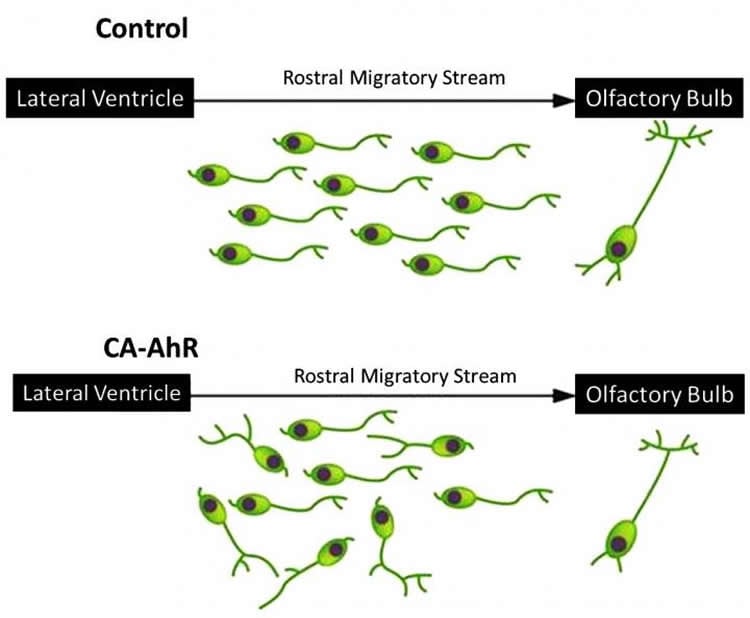Summary: A new study sheds light on how exposure to an environmental toxin can have implications for the developing brain.
Source: University of Tsukuba.
University of Tsukuba-centered researchers shed light on the mechanisms underlying how environmental pollutants alter learning and memory, emotion, and sociality in mice.
Dioxins are environmental pollutants that stay in the body for long periods of time because they can accumulate in fat tissue. They are mainly by-products of combustion and industrial processes. Long-term exposure to dioxins has been suspected to have a host of toxicities, causing health issues such as cancer and impairment of the immune system and the developing nervous system.
In the body, dioxin readily forms a complex with the aryl hydrocarbon receptor (AhR), a transcription factor protein whose real function has yet to be clarified. The manifestations of dioxin toxicities require AhR. It was previously shown that adult rodents born to mice exposed to dioxins during pregnancy display cognitive and behavioral abnormalities. However, the underlying mechanisms of such manifestations have remained unclear.
In search of an answer, researchers centered at University of Tsukuba studied the possible effects of excessive activation of AhR signaling–a phenomenon thought to mimic the exposure of AhR to dioxins–on neurodevelopmental processes in mice, such as cellular migration and neurite growth. Their work was recently published in Scientific Reports.
“We speculate that disrupted AhR signaling is the underlying mechanism of dioxin’s developmental neurotoxicity,” coauthor Eiki Kimura says. “Indeed, we found that excessive activation of AhR signaling slowed the migration of neurons from their origin to their final position in the brain, which is a critical process for normal brain development.” Notably, the migrations are regulated by several proteins whose expression levels are altered by AhR signaling activation.

The findings provide evidence of the pivotal role of AhR signaling in neuronal differentiation and maturation in the developing brain, and clarify how its interaction with harmful chemicals, such as dioxins, can lead to behavioral and developmental alterations.
“The delayed development of migrating neurons, which was caused by excessive AhR signaling, may partially explain dioxin-induced abnormal behavioral alterations previously reported in laboratory animals,” coauthor Chiharu Tohyama explains. “Further studies on the relationship between AhR signaling and cytoskeleton regulation will deepen our understanding of the mechanism of AhR-dependent toxicity.”
Funding: Study funded by Japan Society for the Promotion of Science.
Source: Masataka Watanabe – University of Tsukuba
Image Source: This NeuroscienceNews.com image is credited to University of Tsukuba.
Original Research: Full open access research for “AhR signaling activation disrupts migration and dendritic growth of olfactory interneurons in the developing mouse” by Eiki Kimura, Yunjie Ding and Chiharu Tohyama in Scientific Reports. Published online April 29 2016 doi:10.1038/srep26386
[cbtabs][cbtab title=”MLA”]University of Tsukuba. “How Environmental Toxin Dioxin Alters Brain Development: Mouse Study.” NeuroscienceNews. NeuroscienceNews, 14 June 2016.
<https://neurosciencenews.com/dioxin-neurodevelopment-4467/>.[/cbtab][cbtab title=”APA”]University of Tsukuba. (2016, June 14). How Environmental Toxin Dioxin Alters Brain Development: Mouse Study. NeuroscienceNews. Retrieved June 14, 2016 from https://neurosciencenews.com/dioxin-neurodevelopment-4467/[/cbtab][cbtab title=”Chicago”]University of Tsukuba. “How Environmental Toxin Dioxin Alters Brain Development: Mouse Study.” https://neurosciencenews.com/dioxin-neurodevelopment-4467/ (accessed June 14, 2016).[/cbtab][/cbtabs]
Abstract
AhR signaling activation disrupts migration and dendritic growth of olfactory interneurons in the developing mouse
Perinatal exposure to a low level of dioxin, a ubiquitous environmental pollutant, has been shown to induce abnormalities in learning and memory, emotion, and sociality in laboratory animals later in adulthood. However, how aryl hydrocarbon receptor (AhR) signaling activation disrupts the higher brain function remains unclear. Therefore, we studied the possible effects of excessive activation of AhR signaling on neurodevelopmental processes, such as cellular migration and neurite growth, in mice. To this end, we transfected a constitutively active-AhR plasmid into stem cells in the lateral ventricle by in vivo electroporation on postnatal day 1. Transfection was found to induce tangential migration delay and morphological abnormalities in neuronal precursors in the rostral migratory stream at 6 days post-electroporation (dpe) as well as disrupt radial migration in the olfactory bulb and apical and basal dendritic growth of the olfactory interneurons in the granule cell layer at 13 and 20 dpe. These results suggest that the retarded development of interneurons by the excessive AhR signaling may at least in part explain the dioxin-induced abnormal behavioral alterations previously reported in laboratory animals.
“AhR signaling activation disrupts migration and dendritic growth of olfactory interneurons in the developing mouse” by Eiki Kimura, Yunjie Ding and Chiharu Tohyama in Scientific Reports. Published online April 29 2016 doi:10.1038/srep26386






